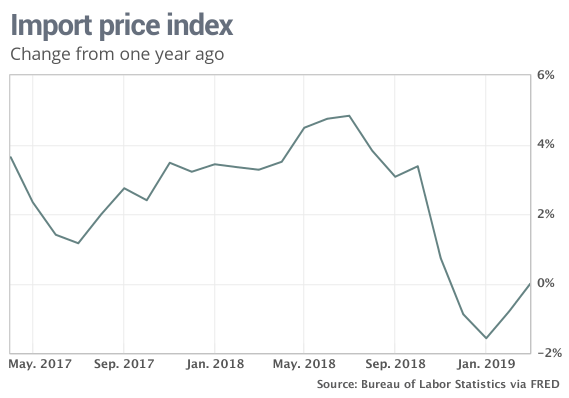 Getty Images
Getty Images
The numbers: The price of imported goods rose sharply in March for the second month in a row, but once again almost all the increase was tied to higher oil prices. The cost of other imports excluding fuel fell, another sign that inflation in the U.S. remains subdued.
The import price index climbed 0.6% last month after a revised 1% gain in February, the government said Friday.
The increase in overall import prices in the last 12 months was flat, however.

If fuel is excluded, what’s more, import prices declined by 0.2%. The cost of nonfuel imports has drooped 0.8% in the past year.
Read: Goldilocks economy? No. But steady job gains, low inflation to keep recession at bay
What happened: The cost of imported fuel rose 6.4% in March, reflecting higher global oil prices. The cost of fuel is similar to where it was a year ago, however, and there’s little sign it will keep surging.
Metal prices also rose, but chemical price fell sharply.
Read: It’s hard to believe, but the U.S. has experienced quarter-century of low inflation
Big picture: The flat cost of imports — gasoline aside — jibes with recent surveys of consumer and wholesale prices that show inflation poses little threat to the economy.
Low inflation has spurred the Federal Reserve to cancel prior plans to raise interest rates this year, a shift that’s led to cheaper borrowing costs for consumers and businesses. That could help the economy recover from a bout of slow growth early in the new year.
Read: Is the tax code fair? Trump tax cuts trigger biggest partisan rift in 20 years
Market reaction: The Dow Jones Industrial Average DJIA, -0.05% and S&P 500 SPX, +0.00% were set to open sharply in Friday trades. Investors appear more optimistic about a U.S. trade deal with China that addresses festering tensions.
The 10-year Treasury yield TMUBMUSD10Y, +2.19% rose a few ticks to 2.54%. Yields are much lower compared to late last year, when they hit a seven-year high of 3.23%.







